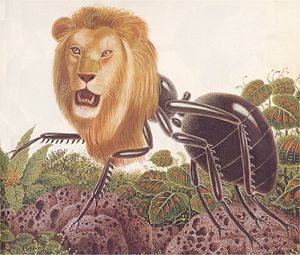The Mermecolion or Ant-Lion is a legendary hybrid creature that appeared in medieval bestiaries. It is also referenced in some sources as a Formicaleon, Formicaleun, Myrmecoleon or Mirmicioleon.
Description
Mermecolion is an inconceivable animal defined by Flaubert in this way: "lion in its foreparts, ant in its hindparts, with the organs of its sex the wrong way". Such a creature is short-lived.
Etymology
In the Scriptures (Job IV: 11) we read: "The old lion perisheth for lack of prey." The Hebrew text has layish for lion; this word, an uncommon one for the lion, seems to have produced an equally uncommon translation. The Septuagint version, harking back to an Arabian lion that Aelian and Strabo call myrmex, forged the Mermecolion. After centuries, the origin of this was forgotten. Myrmex, in Greek, means ant; out of the puzzling words "The ant-lion perisheth for lack of prey" grew a fantasy (translated below by T. H. White) that medieval bestiaries succeeded in multiplying. Physiologus writers used the idea as an allegory for the instability of uncertainty.
Quotes
- "Formicoleon has the name for this, that it is the lion of the ants, or at least ant and lion at the same time. For it is a small creature that is very hostile to ants. It hides itself in the sand and kills the ants as they are carrying grains. And it is called lion and ant because it is, as it were, an ant to other animals, but a lion to ants." (Brehaut, 1912)
- Isidore of Seville
- Early versions of the Physiologus: "Eliphaz the king of the Temanites said, 'The ant-lion perished because it had no food.' The Physiologus said: 'It had the face (or fore-part) of a lion and the hinder parts of an ant. Its father eats flesh, but its mother grains.' If they engender the ant-lion, they engender a thing of two natures, such that it cannot eat flesh because of the nature of its mother, nor grains because of the nature of its father. It perishes, therefore, because it has no nutriment. So is every double-minded man; unstable in all his ways..."
References
- Borges, Jorge Luis, with Margarita Guerrero. 1978. The Book of Imaginary Beings. Revised, enlarged, and translated by Norman Thomas di Giovanni in collaboration with the author. New York: E. P. Dutton.
- Gerhardt, M. I. 1965. The ant-lion nature study on the interpretation of a biblical text, from the Physiologus to Albert the Great. Vivarium. 3: p.1-23.

